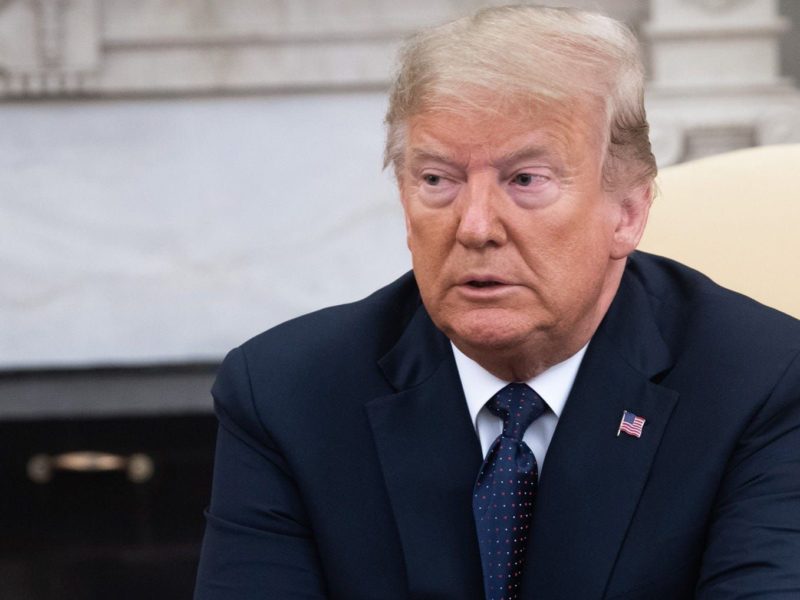
Donald Trump wears a mask as he visits Walter Reed National Military Medical Center in Bethesda, Maryland’ on July 11, 2020.
ALEX EDELMAN/AFP via Getty Images
-
The outbreak of the novel coronavirus has majorly disrupted the 2020 election.
-
At a July 28 hearing before the House of Representatives, Attorney General Bill Barr said he “hadn’t looked into” whether a president can singlehandedly delay a presidential election.
-
Trump cannot cancel or postpone the November 3 general election by executive order, under the parameters of a national emergency or disaster declaration, or even if he declared martial law.
-
And in an extreme scenario where the electoral college does not vote, Trump’s term would still expire at noon on January 20, 2021, meaning control of the presidency would go down the line of succession.
-
Visit Business Insider’s homepage for more stories.
Some critics of President Donald Trump have wondered whether Trump might attempt to seize on the coronavirus crisis by postponing or even canceling this year’s general election, a topic that came up in a July 28 congressional hearing.
In a hearing held by the House Judiciary Committee, Rep. Cedric Richmond of Louisiana asked Attorney General Bill Barr to confirm or deny whether or not a sitting US president can single-handedly change the date of a US presidential election.
Related video: 6 months of the COVID-19 pandemic in the U.S.
Barr did not directly answer the inquiry, saying, “Actually, I haven’t looked into that question under the Constitution.”
Rep. Richmond isn’t the first person to raise the concern.
At an April 23 virtual fundraiser, former Vice President Joe Biden, the presumptive 2020 Democratic presidential nominee, predicted that Trump would try to postpone the election during the coronavirus crisis.
“Mark my words, I think he is gonna try to kick back the election somehow — come up with some rationale why it can’t be held,” Biden said, according to a pool report from CBS’ Bo Erickson.
Trump cannot, however, unilaterally decide to cancel or postpone the November 3 general election by an executive order, under the parameters of a national emergency or disaster declaration, or even if he declared martial law.
Story continues
Experts including the Democratic election lawyer Marc Elias and Josh Douglas, a professor of voting and election law at the University of Kentucky Law School, explained on Twitter in March that only an act of Congress could alter the federal statute to change the date that states appoint their electors.
After all, Americans don’t have a constitutional right to vote for president and do not directly elect the president. When you cast a ballot for a presidential candidate at the polls or by mail, you’re really expressing for how the electors representing your state should vote.
After election results are certified, states send designated electors to gather and vote in the Electoral College, which convenes, per federal law, the first Monday after the second Wednesday in December. The electors submit their votes to elect the next president and vice president to the president of the Senate, a role filled by the presiding vice president.
As Douglas told Insider in a March interview, Congress passed the law standardizing the date of the nationwide presidential election to be the Tuesday after the first Monday in November back in 1845 and hadn’t changed the date since.
The process by which states appoint those electors is laid out both in Article II of the US Constitution, which requires states to appoint a number of electors equal to the number of their representatives in the US House and Senate “in such Manner as the Legislature thereof may direct,” and in Chapter 1 of Title 3 of the United States Code, which sets the timing of that appointment.
To change the date of the election, Congress would have to vote to alter Section 1 of the code, which stipulates: “the electors of President and Vice President shall be appointed, in each State, on the Tuesday next after the first Monday in November, in every fourth year succeeding every election of a President and Vice President.”
Notably, the federal law as written mandates that states appoint a number of electors equal to the number of congressional representatives on that date by some mechanism that the legislature agrees on. It does not, however, require that states even hold elections at all to determine how their electors will be allocated.
Indeed, Douglas told Insider that for much of America’s early history, many states didn’t hold presidential elections as we know them today. Instead, state legislatures both voted to appoint their electors and voted to instruct them how to cast their votes at the Electoral College as opposed to holding an election of the people.
And while all US states now allocate their electoral votes by a popular election in the state, they apportion their electoral votes differently.
Most states use a winner-take-all system, where the candidate who wins over 50% of the vote gets all of the state’s electoral votes.
Maine and Nebraska, however, allocate two of their electoral votes based on the statewide results and the rest proportionally based on the vote share in the state’s congressional districts.
In 2020 especially, trying to cancel or postpone election day voting wouldn’t cancel the election altogether. Tens of millions of voters this year are expected to cast ballots early in-person or by mail weeks before November 3, with North Carolina set to start mailing November mail ballots to voters in just 38 days on September 4 and several other states commencing early voting and sending ballots out starting in mid-September.
Furthermore, trying to postpone or cancel the 2020 election wouldn’t benefit Trump. Even in the far-fetched scenario in which the 2020 presidential electors didn’t formally cast their votes in December, it wouldn’t automatically extend Trump and Vice President Mike Pence’s tenures.
Federal law stipulates that if the electoral college doesn’t vote on the set date, the president and vice president’s terms will automatically expire at noon on January 20, 2021.
Then, control of the presidency would go down the line of succession first to the Speaker of the House of Representatives (assuming that House elections occurred) and then to the president pro tempore of the US Senate.
Read the original article on Business Insider






Leave a Reply